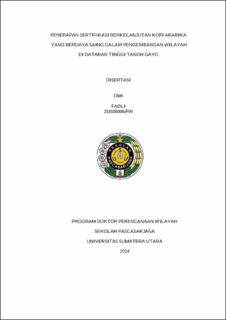| dc.description.abstract | The Gayo Highlands, recognized as one of Indonesia's primary producers of Arabica coffee, possesses significant production potential, with total output reaching approximately 66,000 tons in 2022. This study focuses on developing certified Arabica coffee in the Gayo Highlands, encompassing certifications such as Fair Trade, Organic (NOP USDA and EU), CAFÉ Practices, and Rainforest Alliance. These certifications ensure product quality and farmer welfare while meeting international standards. This research aims to analyze Arabica coffee's potential, the status of certifications from economic, ecological, social, institutional, and technological perspectives, the urgency of certification for competitiveness, and the strategies for developing certified coffee plantation-based regions. The analytical methods employed include Location Quotient (LQ), Multidimensional Scaling (MDS), Policy Analysis Matrix (PAM), and SWOT analysis. The findings indicate that the potential for Arabica coffee in the Gayo Highlands, particularly in Aceh Tengah and Bener Meriah, is substantial, with LQ values exceeding 1, precisely 6.051 for Aceh Tengah and 6.317 for Bener Meriah. The sustainability index for certified coffee yields an average value of 64.56, reflecting the potential to enhance the quality and competitiveness of coffee in the international market. The average profit structure for Arabica coffee farmers in the Gayo Highlands demonstrates a private profit of IDR 54,193,184 per hectare per year and a social profit of IDR 56,582,484 per hectare per year. The DRC value of 0.0089 and the PCR of 0.0075 indicate high production efficiency and profitability. The strategy for developing certification-based regions emphasizes strengthening partnerships with international buyers to enhance competitiveness and improve sustainable practices in coffee production. Necessary policies include government support to reduce certification costs and raise awareness of the importance of sustainability among farmers. | en_US |


